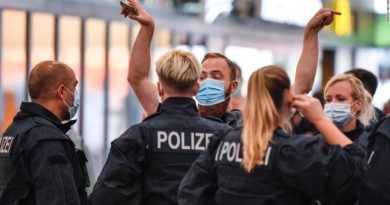India’s COVID-19 cases near 20 million, peak seen nearing
India reported more than 300,000 new coronavirus infections for a 12th straight day on Monday to take its overall number of cases to just shy of 20 million, as scientists predicted a peak in the pandemic in the coming days.
With 368,147 new cases over the past 24 hours, India’s total infections stand at 19.93 million, while total fatalities rose by 3,417 to 218,959, according to health ministry data.
Medical experts say actual numbers across the country of 1.35 billion may be five to 10 times higher than the official tally.
The health ministry offered a glimmer of hope, reporting that positive cases relative to the number of tests conducted fell on Monday for the first time since at least April 15.
India’s coronavirus cases may peak between May 3-5, according to a mathematical model from a team of scientists advising the government, a few days earlier than a previous estimate as the virus has spread faster than expected.
Hospitals have filled to capacity, medical oxygen supplies have run short and morgues and crematoriums have been swamped as the country deals with the surge in cases.
At least 11 states and union territories have imposed some form of restrictions on movement to try and stem infections, but Prime Minister Narendra Modi’s government is reluctant to announce a national lockdown, concerned about the economic impact.
“In my opinion, only a national stay at home order and declaring medical emergency will help to address the current healthcare needs,” Bhramar Mukherjee, an epidemiologist with the University of Michigan said on Twitter.
“The # of active cases is accumulating, not just the daily new cases. Even the reported numbers state there are around 3.5M active cases.”
CRISIS TESTS MODI
The spike in infections is India’s biggest crisis since Modi took office in 2014. Modi has been criticised for not taking steps earlier to curb the spread and for letting millions of largely unmasked people attend religious festivals and crowded political rallies in five states during March and April.

A forum of scientific advisers set up by the government warned Indian officials in early March of a new and more contagious variant of the coronavirus taking hold in the country, five scientists who are part of the forum told Reuters.
Despite the warning, four of the scientists said the federal government did not seek to impose major restrictions to stop the spread of the virus.
It remains to be seen how his handling of the crisis might affect Modi or his party politically. The next general election is due in 2024. Modi’s party was defeated in India’s West Bengal state in results declared on Sunday, although it won in the neighbouring state of Assam.
Leaders of 13 opposition parties signed a letter on Sunday urging Modi to immediately launch free national vaccination and to prioritise oxygen supply to hospitals and health centres.
Several states have postponed widening a vaccination drive for adults that was to start on Saturday due to a lack of vaccines. Despite being the world’s biggest producer of vaccines, India does not have enough for itself. Only about 9% of the populationhas had a dose.
India has struggled to increase capacity beyond 80 million doses a month due to lack of raw materials and a fire at the Serum Institute, which makes the AstraZeneca vaccine.
Pfizer Inc (PFE.N) is in talks with the Indian government seeking an “expedited approval pathway” for its COVID-19 vaccine, its CEO Albert Bourla said on LinkedIn on Monday, announcing a donation of medicines worth more than $70 million.
India said last month its drugs regulator will decide on emergency-use applications for foreign COVID-19 vaccines, including Pfizer, within three working days from application.
International aid has been pouring into India in response to the crisis.
Britain will send another 1,000 ventilators to India, the government said on Sunday. Prime ministers Boris Johnson and Modi are scheduled to talk on Tuesday.
The Indian COVID-19 variant has now reached at least 17 countries including Britain, Switzerland and Iran, leading several governments to close their borders to people travelling from India.
Our Standards: The Thomson Reuters Trust Principles.




